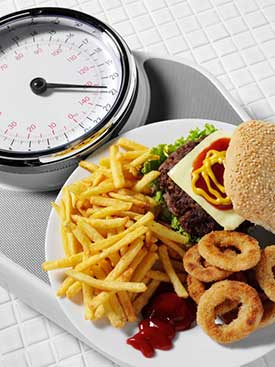Food Addiction Treatment in Indianapolis, IN

What is Food Addiction?
Food addiction is a real problem, just like addiction to substances. When talking about other addictions such as drugs and alcohol, remember that you can live without drugs and alcohol. The goal of substance abuse treatment—especially with drugs and alcohol—typically involves total abstention, which is an impossible goal in food addiction. Instead, food addiction treatment focuses on education and moderation so you can live a healthier life.
For individuals who struggle with food addiction, eating usually goes beyond sustenance and pleasure to become a compulsive and addictive behavior. While many people overindulge from time to time, a food addict usually struggles with managing food intake on a daily basis. Many food addicts have a strong desire to get healthy, but have difficulty controlling their urges.
Signs of Food Addiction
Food addiction affects people physically, emotionally, spiritually and socially. Many food addicts become preoccupied with food and often plan their lives around their eating preference. Food addicts also spend significant amounts of time thinking about or consuming food. In many cases, food addicts don't realize that they have a problem because their poor eating habits have become a normal part of life. The most common signs of food addiction include:
- Endless obsession with food
- Regularly overeating
- Constant snacking
- Eating at strange times
- Hiding eating habits
- Poor body image
- Feeling shame or guilt after eating
Causes and Types of Food Addiction
Like other addictive substances, food can trigger the release of feel-good chemicals in the brain, like dopamine. This chemical is related to pleasure, so when it's triggered by food, your brain begins to create a positive link between food and emotional wellbeing. Once people experience pleasure associated with increased dopamine transmission in the brain's reward pathway from eating certain foods, they quickly feel the need to eat again. There are several types of food addictions, each causing health complications that lead to increased risk of heart disease, type 2 diabetes , and more.
The most common types of food addictions include:
- Binge eating disorder: Also known as compulsive overeating, this condition causes an individual to engage in frequent episodes of uncontrolled eating, or binging.
- Bulimia nervosa: In this condition episodes of binge eating are followed by attempts to prevent weight gain through purging behaviors.
- Anorexia nervosa: This progressive disorder is characterized by a fear of gaining weight and a warped sense of body image.
- General food addiction: People who consume salty, sugary or fatty foods at an excessive rate who do not try to hide their addiction usually fall under this classification of food addiction.
Food Addiction Treatment
Food addiction is often treated in the same manner as any other addiction. Experts agree that an addicted brain works in the same way, regardless of what the person is addicted to. If you or someone you know is suffering with this condition, it's important to remember that addiction rarely resolves on its own. A food addiction is no exception—that's why early intervention and treatment is imperative. Treatment is designed to help reestablish a healthy relationship with food and allow you to return to a life of improved health.
Treatment usually consists of some combination of behavioral therapy, nutritional counseling , education and social support. If it is determined that the cause of your food addiction is the result of an emotional disorder such as anxiety or depression, psychological counseling and medication can often reduce food addiction.
Request more information about Food Addiction Treatment today. Call (765) 259-0545 or contact Charles Turner MD online.
Innovative Medicine
Address
3554 Promenade PkwySuite H
Lafayette, IN 47909
(765) 259-0545
www.innovativemedicine.org
Hours
Mon:
8:30 am - 5:00 pm
Tue:
8:30 am - 5:00 pm
Wed:
8:30 am - 5:00 pm
Thu:
8:30 am - 5:00 pm
Fri:
Closed
Sat:
Closed
Sun:
Closed
